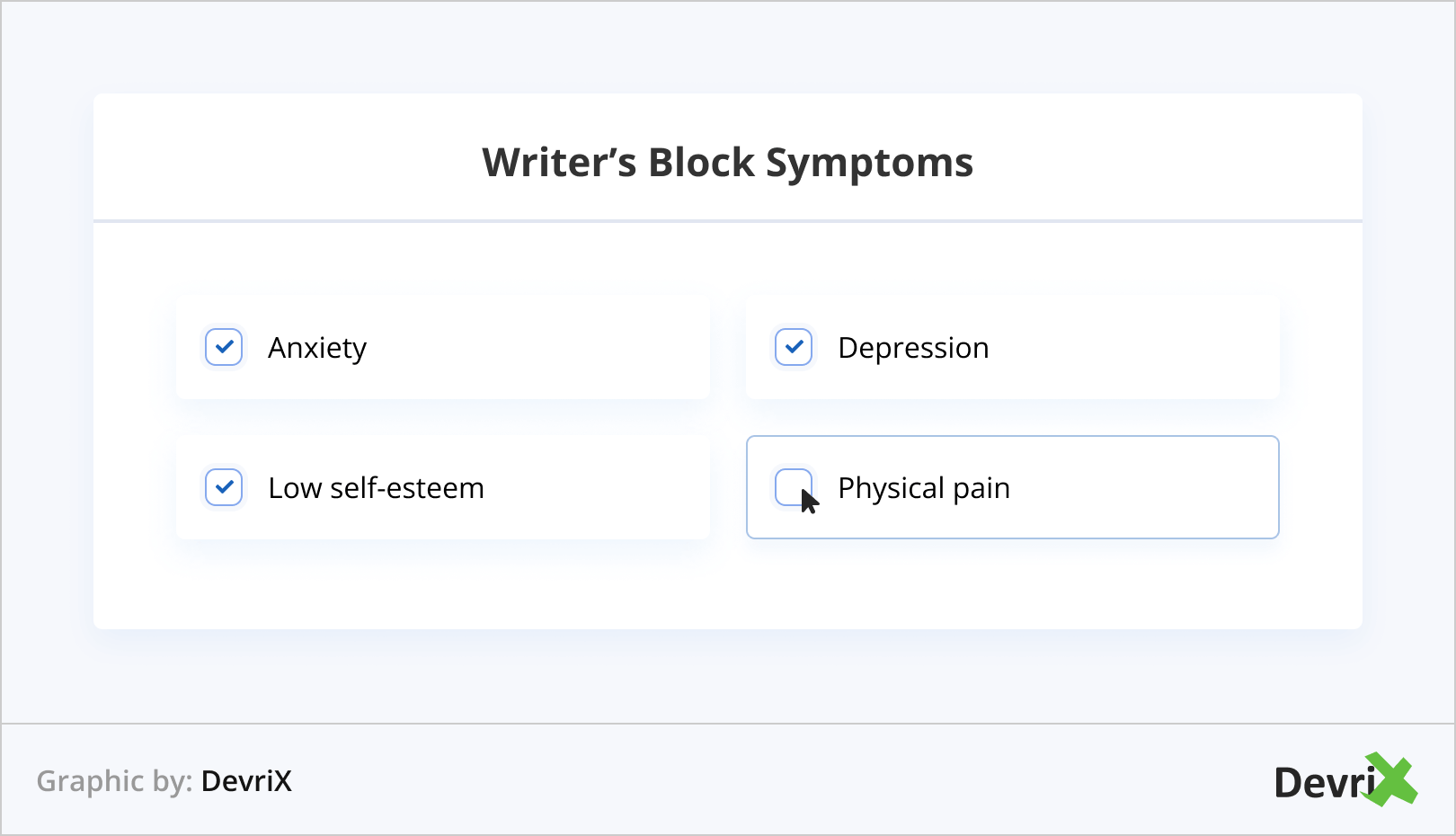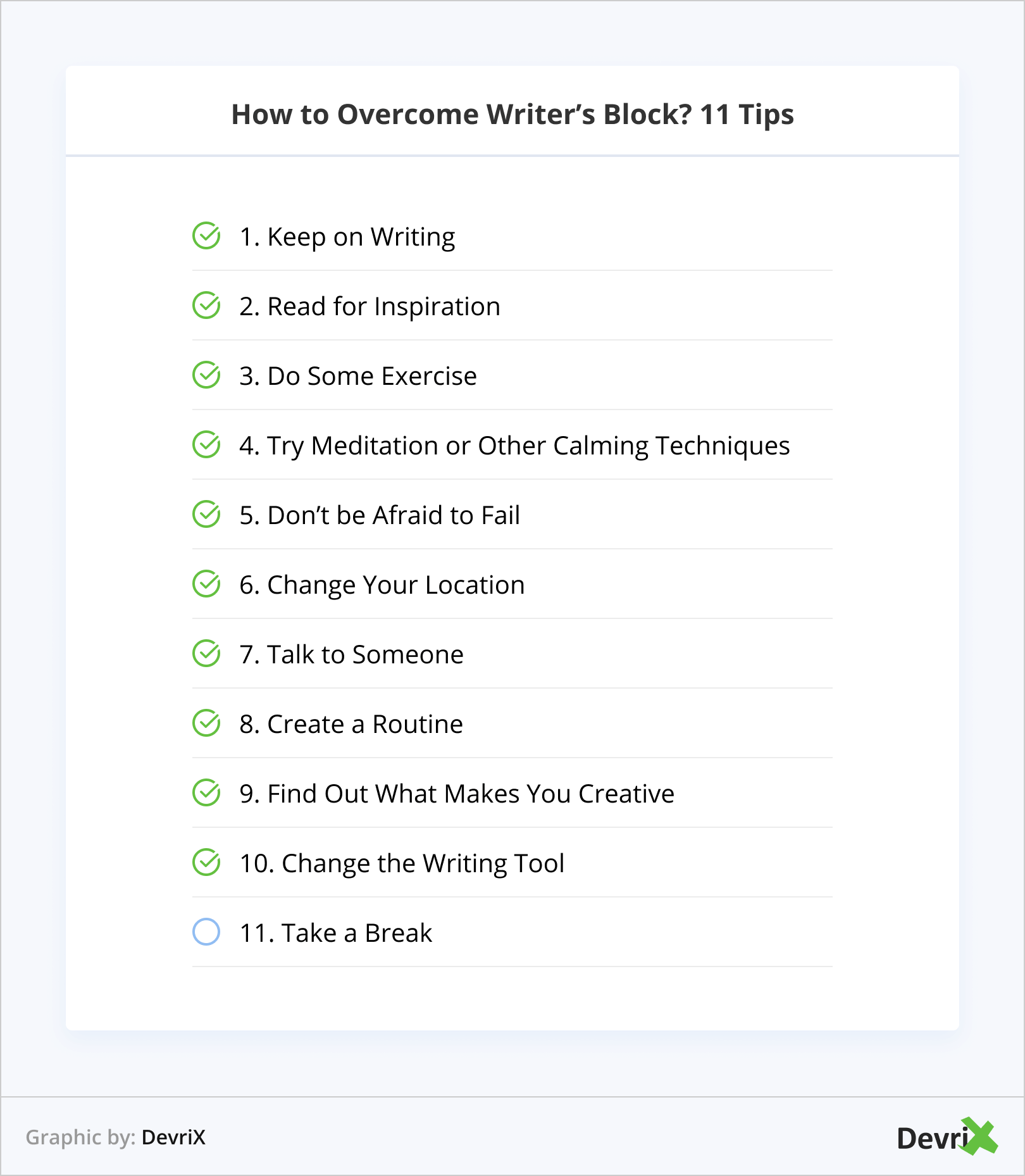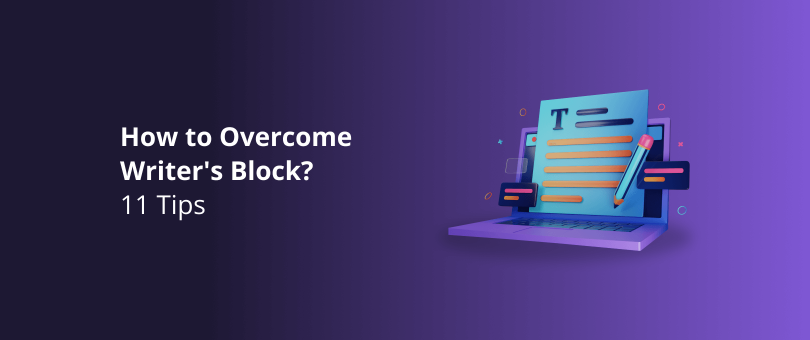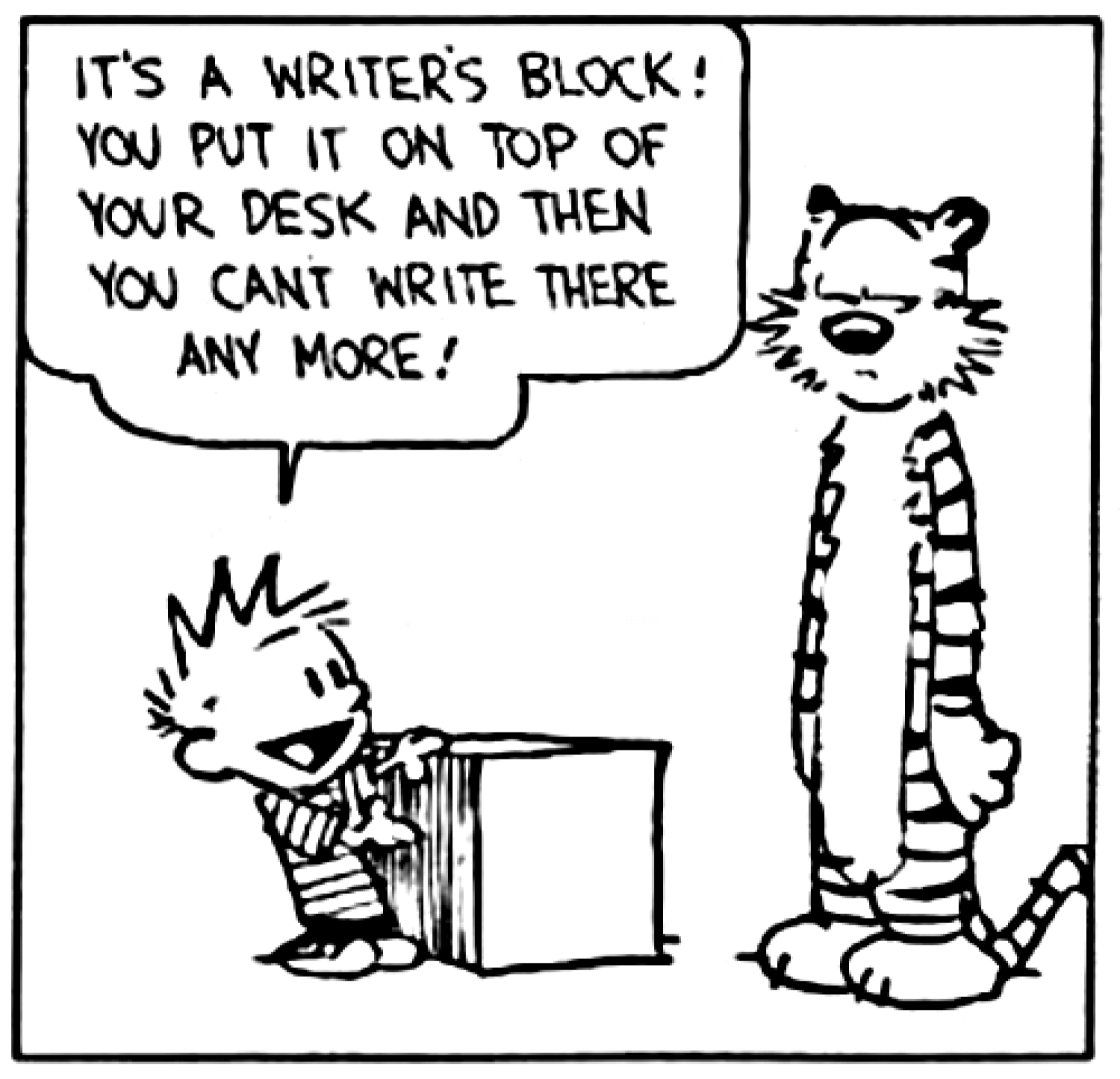Even the best and most productive writers reach the point where they just can’t write anything. You sit down in front of the blank screen, you get frustrated, you feel angry, guilty, and anxious.
Trust me, every writer has been there.
But how do you deal with it and carry on with your life and job?
Let’s try to find out together.
Readers Also Enjoy: Common Mistakes Content Writers Make [How to Write Better] – DevriX
Writer’s Block Symptoms

In order to solve the problem of writer’s block and how to overcome it, it’s good to know what the symptoms are in the first place. Naturally, the signs vary from person to person, but these are the most common symptoms:
- Anxiety. It’s hard for you to think about anything else than writing, and just the thought of writing makes you worried and puts you in a bad emotional state.
- Depression. You are not able to write as much as you are used to, or you’re totally unhappy with what you wrote. This makes you feel sad, lethargic and hopeless.
- Low self-esteem. This is especially true if you’re working a demanding job, or you’re too self-critical. Most of the time, you feel doubtful about your own capabilities, and start to think that you’re a lousy writer and a failure.
- Physical pain. It’s not uncommon for mental problems to affect the body, as well. For example, you could experience digestive problems, sweaty palms, headaches, and muscle tension, all because you can’t write with your usually quality and quantity.
How to Overcome Writer’s Block? 11 Tips

- Keep on Writing
- Read for Inspiration
- Do Some Exercise
- Try Meditation or Other Calming Techniques
- Don’t be Afraid to Fail
- Change Your Location
- Talk to Someone
- Create a Routine
- Find Out What Makes You Creative
- Change the Writing Tool
- Take a Break
1. Keep on Writing
Sometimes you just need to keep at it, without overthinking and worrying about the quality of your text. After all, you will review everything at some point, and probably an editor will too.
Therefore, you should simply sit down and write whatever comes to mind. Keep those creative juices flowing, and leave the editing for when you’re done. It’s much better than stressing out over every word and sentence.
2. Read for Inspiration
The best way to kindle your imagination is a book. A real, physical book, not electronic readers. Allow yourself some time to read, relax, and let your imagination guide you towards overcoming your writer’s block.
If you need a little help, there are a lot of lists with inspirational books on the Internet. Find the one that suits you best and let the creative juices flow.
Readers Also Enjoy: Actionable Blog Writing Tips for Beginners – DevriX
3. Do Some Exercise
Writing is such a serious mental activity that it often completely drains your energy. One thing that can re-energize your mind is to tire your body. Try out different activities and find the one best for you – it might be a long walk, heavy lifting, stretching, etc.
Furthermore, it’s proven that physical activity helps to reduce anxiety and depression, so who knows, maybe that’s exactly what you need to get back on track.
4. Try Meditation or Other Calming Techniques
Meditation can be helpful for a lot of things in life, and one of them is to help with writer’s block. Of course, it can be hard to start off meditating, especially if you’re an absolute beginner.
It’s still worth a try, though, more so if you’ve already experimented with a lot of other methods, and nothing has helped you.
Meditation helps you relax your mind, focus on breathing, and let go of all your worries. It can help you not only with writer’s block, but in a lot of other aspects of life, as well.
5. Don’t Be Afraid to Fail
There’s nothing wrong with failure. Everyone fails, we are all human, after all. Or as Confucius put it: “Our greatest glory is not in never failing, but in rising every time we fail.”
Remember that every failure makes you stronger, and can teach you valuable lessons. You all probably know the story of how Stephen King used to stick every rejection letter with a pin to his wall, and how by the time he was 14, the pin could no longer support the weight of the rejections.
The moral of the story is that he never gave up, he kept writing, and now he is where he is today thanks to his perseverance.
6. Change Your Location
Sometimes your surroundings can affect your anxiety. For instance, the same old space where you write every day, and that you are sick and tired of it, could certainly contribute towards you feeling blocked.
Why not try a change of scenery? Go on a vacation, or somewhere relaxing, or alternatively, if you can’t afford it right now, try writing from a different location, be it a local café, another room, or even from the park.
What’s more, if you’re a content writer, you could change the subject of your writing, as repetitive topics can also contribute to blocking.
Readers Also Enjoy: Actionable Blog Writing Tips for Beginners – DevriX
7. Talk to Someone
Quite often, writers are introverted creatures that prefer spending most of their time alone (writing). Still, from time to time, it’s a good idea to talk to someone.
Share what’s bothering you, get the negativity out of your system. Who knows – that could be the exact thing you needed all along.
Of course, don’t be afraid to talk to a specialist, especially if there’s no one else you can talk with. This doesn’t mean you’re crazy, it’s completely normal to ask for professional help once in a while.
8. Create a Routine
Some writers have a habit of writing during a time frame every day, while others are more chaotic and wait for inspiration. The latter is usually counterproductive.
Developing a routine can help you establish strong writing habits, not to mention that it can help you avoid writer’s block.
What’s important is to stick to your routine once you’ve established it. Let’s say you plan on writing every day from 10 to 19, with a lunch break, and a couple of short breaks.
Follow that daily routine, and sooner or later your brain will make a habit out of it. You’ll even start feeling strange if you don’t write, like on weekends.
9. Find Out What Makes You Creative
This one is entirely up to your personality, as it can be all sorts of different things depending on the person. One might be inspired by the autumn leaves, another might find his creative juices flowing from watching the ceiling, and so on, you get the point.
All things said, it’s vital to know what can unleash your creativity.
Readers Also Enjoy: Copywriting for Marketing: How to Write Compelling Marketing Copy – DevriX
10. Change the Writing Tool
Do you typically write on a keyboard? Maybe a typewriter, if you’re more old-fashioned. The thing is that the writing tool could be contributing towards your blockage, without your realizing it.
It won’t harm you to try something new, and see whether that has any effect on your writing. When was the last time you used pen and paper to write? Alternatively, at least you can try a new keyboard just to have something new and fresh in front of you.
11. Take a Break
If nothing else helps, and you have tried your best… well, it’s time for a break. Pack your bags, go somewhere far, and clear your mind of any thoughts related to writing.
Still, just in case, you should take a laptop or pen and paper with you – inspiration might finally come when you least expect it.
Conclusion
Writer’s block is a serious mental health issue – don’t ignore it. Try to follow all the tips and advice given, as well as finding out what you can do to get back on track.
Hopefully our article on how to overcome writer’s block was helpful to you. Please, do let us know if you have any other suggestions.





